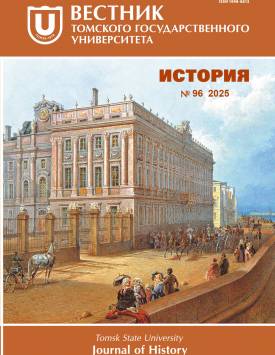The Cholera Epidemic, Public Opinion and Expert Medical Knowledge in Siberia (1891–1892)
The article examines public opinion in Siberia during the cholera epidemic of 1892, which was part of the fifth cholera pandemic. In Russian history, it was preceded by a famine that began in 1891 and became a strong destabilizing factor in the socio-political life of the country. In historiography, the high mortality rate of those years was explained by the cholera epidemic. It is thereby often the assessment of the socio-political consequences of the famine. Meanwhile, the authorities' response to the epidemic caused no less criticism in public circles than the famine. Cholera in all countries contributed to the increase in socio-political tension. Russia was no exception. A series of riots and rebellions swept it in 1892. The socio-political situation in Siberia at that time remains unstudied. Meanwhile, the organization of health care was even worse than in the European part of Russia. By the end of the 19th century, various social forces emerged in the region that used the press to promote their views. To study public opinion in the region and the strategies for responding to the epidemic that prevailed in Siberian society, a new method was used that had not been previously used, at least in Russian historiography: a study of digitized newspapers using automated text recognition and analysis systems. Government, private, and church newspapers published in the region were selected as sources for the study. Five groups of words-marker were identified: linked with the disease, “soft” and “hard”, individual and collective approaches to responding to the challenge of the epidemic. The frequency of their use in all newspaper issues for 1891 -1892 was determined. Then, the mutual arrangement of the disease marker words, on the one hand, and the marker words of other groups on the other hand, was determined. The conducted research allowed us to draw a conclusion about the absolute dominance of the “hard” and collective approaches to the response to the cholera epidemic of 1892 in Siberia. This trend resonated with the mood of the authorities. The role of the intellectual super-minority in the region - Tomsk medical professors - is especially assessed. On the contrary, they took a more reserved position in assessing the social nature of the epidemic and never became a reliable ally of the authorities. The authors declare no conflicts of interests.
Keywords
cholera epidemic 1892, Siberia, medicine, knowledge institutions, public opinionAuthors
| Name | Organization | |
| Stepnov Alexei O. | Tomsk State University | brothe.numb1@gmail.com |
| Nekrylov Sergei A. | Tomsk State University | medicinahistory@yandex.ru |
| Kovalev Alexandr E. | Siberian (Tomsk) Centerfor the Study of Artificial Intelligence and Digital Technologies | kovalev-aleksandr02@mail.ru |
References

The Cholera Epidemic, Public Opinion and Expert Medical Knowledge in Siberia (1891–1892) | Tomsk State University Journal of History. 2025. № 96. DOI: 10.17223/19988613/96/11
